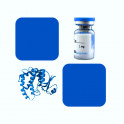
- Remove this product from my favorite's list.
- Add this product to my list of favorites.
Products
Newsletter
 |  |  |  |  |  |

Background
Nucleocapsid (N) protein is the most abundant protein found in coronavirus. CoV N protein is a highly immunogenic phosphoprotein important for viral genome replication and modulation of cell signaling pathways. It was first identified by a research team while they were screening for ADP-ribosylated proteins during coronavirus (CoV) infection (Grunewald M. E., et al. 2017, Virology; 517: 62-68). The array of diverse functional activities accommodated in N protein makes it more than a structural protein but also an interesting target in the development of antiviral therapeutics. Because of the conservation of N protein sequence and its strong immunogenicity, N protein of coronavirus is chosen as a diagnostic tool.
Source
Recombinant 2019-nCoV (COVID-19) Nucleocapsid protein, His Tag (NUN-C51H9) is expressed from E.coli cells. It contains AA Met 1 - Ala 419 (Accession # QHO62115.1). Predicted N-terminus: Met
Molecular Characterization
This protein carries a polyhistidine tag at the N-terminus.
The protein has a calculated MW of 49.4 kDa. The protein migrates as 47-50 kDa under reducing (R) condition (SDS-PAGE).
Endotoxin
Less than 1.0 EU per μg by the LAL method.
Purity
>90% as determined by SDS-PAGE.
Formulation
Lyophilized from 0.22 μm filtered solution in 50 mM Tris, 150 mM NaCl, Arginine, pH7.5 with trehalose as protectant.
Reconstitution
See Certificate of Analysis for reconstitution instructions and specific concentrations.
Bioactivity
Please refer to product data sheet.
Storage
For long term storage, the product should be stored at lyophilized state at -20°C or lower.
Please avoid repeated freeze-thaw cycles.
This product is stable after storage at:
-20°C to -70°C for 12 months in lyophilized state;
-70°C for 3 months under sterile conditions after reconstitution.
(1) "Humoral immune response to SARS-CoV-2 and endemic coronaviruses in urban and indigenous children in Colombia"
Fernández Villalobos, Marsall, Torres Páez et al
Commun Med (Lond) (2023) 3 (1), 151
(2) "Assembly of SARS-CoV-2 ribonucleosomes by truncated N* variant of the nucleocapsid protein"
Adly, Bi, Carlson et al
J Biol Chem (2023)
(3) "Production and performance assessment of a SARS-CoV-2 biomimetic in a verification program for pandemic readiness"
Machowski, Reyneke, Sher et al
J Mol Diagn (2023)
Showing 1-3 of 54505 papers.
(1) "5G-enabled ultra-sensitive fluorescence sensor for proactive prognosis of COVID-19"
Authors: Guo J, Chen S, Tian S, et al.
Journal: Biosens Bioelectron 2021
Application: Binding Assay
Follow us